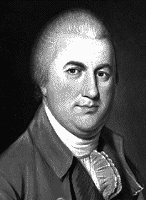Like moderate nationalists, the moderates favored the Virginia Plan
over the New Jersey Plan and opposed equal representation in the Senate. However, while moderate nationalists looked
upon a stronger central government as positive and creative, the moderates saw
threat as well as promise in it. They
agreed that that the central government should have authority over individuals
as well as states, but they wanted to preserve more state agency in it. In particular, moderates indignantly opposed
the federal veto of state laws. Most
also believed that states should pay federal representatives. Elbridge Gerry of Massachusetts (yes, he of
the Gerrymander) is the best known of the moderates today. The others came from the Deep Southern states
of North Carolina or South Carolina – medium states that aspired to be large.
Hugh Williamson (North
Carolina):
Like others in this category, Hugh Williamson's most significant
nationalist position was that he opposed equal representation in the
Senate. Just as states give greater
representation to larger counties, Congress should give greater representation
to larger states. He was willing to see the issue sent to committee, but he did not like the
proposed Great Compromise, as he did not consider giving the House sole
authority to originate money bills as any significant concession by small
states. On the other hand,
after the Great Compromise was reached, when some delegates proposed to allow
the Senate to originate money bills, he threatened to take back equality in the
Senate.
In most other regards, Williamson was less of a nationalist. Like most moderates, he believed members of
Congress should be paid by states. He considered the happiness of the people to depend on the continued existence of
states and believed that if state officials were required to take an
oath to uphold the federal constitution, then federal officials should be
required to take an oath to uphold state constitution. When Gouverneur Morris made the rash remarks quoted above, Williamson attempted to be conciliatory. “He did not conceive the [Mr. Gov’r Morris]
meant that the sword ought to be drawn against the smaller states. He only pointed out the probable consequences
of anarchy in the U.S.”
Pierce Butler (South Carolina):
South Carolina had four delegates who made a significant contribution
to the convention, more than any other state.
One of these was Pierce Butler. Butler had initial misgivings about the Virginia Plan. He feared that it took too much power from the
states, particularly with the vague phrase giving the National Legislature
power “in all cases to which the State Legislatures were individually
incompetent,” which could run into an extreme and destroy “all balance and
security of interests among the States which it was necessary to
preserve.” He did, however, believe that a bicameral
legislature and separations of powers would make it safer to give increased
powers to the new government than the old Continental Congress. Like other moderates, Butler opposed equal
representation in the Senate and did not consider giving the House sole
authority to originate money bills to be a significant concession in exchange.* However, he did not want to base the Senate
on population, but on wealth. Population
was too changeable to be a fixed standard, whereas property was the great
object of government, the great cause of war and the great means of carrying it
on. Like Williamson, he favored
having states pay Congressional representatives. Butler did not think federal trial courts (as
opposed to appellate courts) were necessary.
Though generally distrustful of the central government, Butler favored submitting the whole militia to the general authority, which had the care of
the general defense. That last,
incidentally, is part of a general pattern by Butler that I hope to discuss
later – although general distrustful of the central government, he made an
exception wherever military security was at stake.
*This was a concern among most of the South Carolina delegation. Apparently the South Carolina legislature limited money bills to the lower house, and serious problems arose as a result.
*This was a concern among most of the South Carolina delegation. Apparently the South Carolina legislature limited money bills to the lower house, and serious problems arose as a result.








